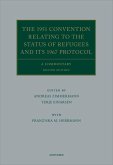The Fourth Geneva Convention, signed on 12th August 1949, defines necessary humanitarian protections for civilians during armed conflict and occupation. One-hundred-and-ninety-six countries are signatories to the Geneva Conventions, and this particular facet has laid the foundations for all subsequent humanitarian global law.
How did the world - against seemingly insurmountable odds - draft and legislate this landmark in humanitarian international law? The Fourth Geneva Convention for Civilians draws on archival research across seven countries to bring together the Cold War interventions, founding motives and global idealisms that shaped its conception. Gilad Ben-Nun draws on the three key principles that the convention brought about to consider the recent events where its application has either been successfully applied or circumvented, from the 2009 Gaza War, the war crimes tribunal in the former Yugoslavia and Nicaragua vs. the United States to the contemporary conflict in Syria.
Weaving historical archival research, a grounding in the concepts of international law, and insightful analysis of recent events, this book will appeal to a broad range of students, academics and legal practitioners.
How did the world - against seemingly insurmountable odds - draft and legislate this landmark in humanitarian international law? The Fourth Geneva Convention for Civilians draws on archival research across seven countries to bring together the Cold War interventions, founding motives and global idealisms that shaped its conception. Gilad Ben-Nun draws on the three key principles that the convention brought about to consider the recent events where its application has either been successfully applied or circumvented, from the 2009 Gaza War, the war crimes tribunal in the former Yugoslavia and Nicaragua vs. the United States to the contemporary conflict in Syria.
Weaving historical archival research, a grounding in the concepts of international law, and insightful analysis of recent events, this book will appeal to a broad range of students, academics and legal practitioners.









